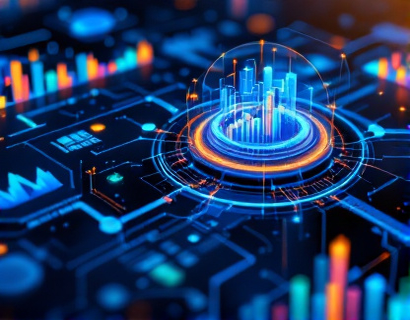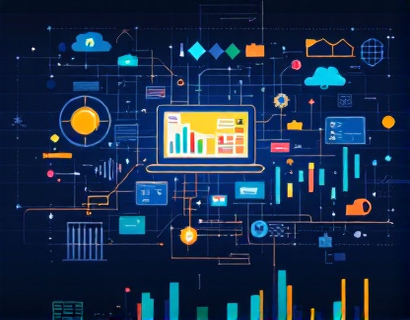AI and Crypto: Catalysts for Next-Gen Productivity Transformation in the Digital Age
The integration of Artificial Intelligence (AI) and cryptocurrency is revolutionizing the digital landscape, offering unprecedented opportunities to enhance productivity and redefine efficiency in the modern workplace. This transformation is not merely a technological advancement but a paradigm shift that is reshaping how businesses operate and individuals work. The synergy between AI and cryptocurrency is unlocking advanced solutions that streamline tasks, optimize processes, and create new avenues for innovation.
To understand this transformation, it's essential to delve into the core capabilities of AI and cryptocurrency and how they complement each other. AI, with its ability to process vast amounts of data, learn from patterns, and make intelligent decisions, is transforming industries across the board. From healthcare to finance, AI is enhancing decision-making, automating routine tasks, and providing insights that were previously unattainable. Cryptocurrency, on the other hand, represents a decentralized and secure form of digital currency, enabling transactions without the need for intermediaries. The combination of these two technologies is creating a powerful ecosystem that is redefining productivity.
Enhancing Task Automation with AI
One of the most significant impacts of AI on productivity is through task automation. AI-driven tools can automate repetitive and time-consuming tasks, allowing employees to focus on higher-value activities. For instance, AI-powered chatbots can handle customer inquiries, freeing up customer support teams to tackle more complex issues. Similarly, AI algorithms can automate data entry, report generation, and even project management tasks, significantly reducing the time and effort required to complete these tasks.
The integration of AI in workflow management tools is another area where productivity is soaring. These tools use AI to predict bottlenecks, optimize resource allocation, and streamline workflows. By analyzing historical data and real-time inputs, AI can provide actionable insights that help managers make informed decisions, further enhancing efficiency. For example, AI can identify the most efficient routes for delivery services, reducing travel time and fuel costs.
Cryptocurrency and Decentralized Workflows
Cryptocurrency introduces a new dimension to productivity by enabling decentralized workflows. Traditional financial systems often involve intermediaries such as banks and payment processors, which can slow down transactions and increase costs. Cryptocurrency eliminates these intermediaries, allowing for faster and more cost-effective transactions. This is particularly beneficial for global businesses that frequently engage in cross-border transactions.
Smart contracts, a key feature of blockchain technology, are revolutionizing contract management and execution. These self-executing contracts with the terms directly written into code can automate and enforce agreements without the need for intermediaries. This not only speeds up processes but also reduces the risk of fraud and errors. For instance, in supply chain management, smart contracts can ensure that payments are made only when specific conditions are met, such as the delivery of goods, thereby enhancing trust and efficiency.
Data Security and Privacy
The combination of AI and cryptocurrency also addresses critical concerns around data security and privacy. AI can enhance security measures by detecting and mitigating threats in real-time. Machine learning algorithms can analyze patterns to identify anomalies and potential security breaches, providing a proactive defense against cyber threats. This is crucial in an era where data breaches are increasingly common and can have severe consequences for businesses.
Cryptocurrency, with its inherent security features, complements AI's security capabilities. Blockchain's decentralized and immutable nature ensures that once data is recorded, it cannot be altered or deleted. This provides a high level of data integrity and transparency. For sensitive information, such as financial transactions or personal data, the combination of AI and cryptocurrency offers a robust solution that enhances both security and privacy.
Enhancing Decision-Making with AI-Driven Insights
AI's ability to process and analyze large datasets provides valuable insights that can drive better decision-making. In the context of business, AI can analyze market trends, customer behavior, and operational data to offer predictive analytics and recommendations. This helps organizations anticipate market changes, optimize inventory, and personalize customer experiences.
Cryptocurrency markets, known for their volatility, can also benefit from AI-driven insights. AI algorithms can analyze vast amounts of market data to identify trends, predict price movements, and optimize trading strategies. This not only enhances the efficiency of trading but also reduces the risk associated with market fluctuations. For investors and traders, the integration of AI and cryptocurrency provides a powerful tool for making informed decisions.
Fostering Innovation and Collaboration
The convergence of AI and cryptocurrency is fostering a culture of innovation and collaboration. Developers and entrepreneurs are leveraging these technologies to create new applications and services that were previously unimaginable. For example, decentralized finance (DeFi) platforms are using AI to enhance lending, borrowing, and trading services, offering more accessible and efficient financial solutions.
Moreover, the open-source nature of many AI and blockchain projects encourages collaboration among developers and organizations. This collaborative ecosystem accelerates innovation, as individuals and companies can build upon each other's work, leading to rapid advancements and the development of more sophisticated tools. The community-driven approach ensures that the benefits of these technologies are shared widely, promoting inclusivity and democratizing access to advanced solutions.
Challenges and Considerations
While the integration of AI and cryptocurrency offers numerous benefits, it also presents challenges that need to be addressed. One of the primary concerns is the regulatory landscape. As these technologies evolve, governments and regulatory bodies are grappling with how to govern them effectively. Ensuring compliance while fostering innovation is a delicate balance that requires ongoing dialogue and adaptation.
Another challenge is the technical complexity involved in integrating AI and cryptocurrency solutions. Organizations need to invest in skilled personnel and infrastructure to implement these technologies effectively. Additionally, there is a need for education and training to help users understand and leverage these tools to their full potential.
Future Prospects
Looking ahead, the integration of AI and cryptocurrency is poised to drive further transformations in productivity. As AI algorithms become more advanced, they will continue to enhance automation, decision-making, and security. The adoption of blockchain technology in various industries will deepen, leading to more decentralized and transparent systems.
The rise of Web 3.0, a decentralized internet powered by blockchain, will further integrate AI and cryptocurrency into everyday digital interactions. This new web will enable more secure, private, and user-controlled digital experiences, revolutionizing how we work, communicate, and transact. The potential for innovation is vast, and the next few years will be crucial in shaping the future of digital productivity.
In conclusion, the synergy between AI and cryptocurrency is a game-changer for productivity in the digital age. By automating tasks, enabling decentralized workflows, enhancing data security, and providing valuable insights, these technologies are redefining efficiency and innovation. As organizations and individuals embrace these advancements, the future of productivity looks brighter and more interconnected than ever before.











































